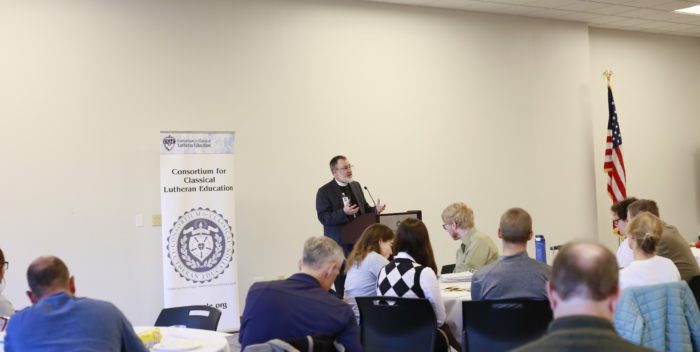Concordia Hosts Consortium for Classical Lutheran Education Conference
Meredith Boster
Sower Staff
The Rev. Steve Keiser and Dr. Gene Edward Vieth joined Dr. Gabriel Haley on Oct. 20 on Concordia’s campus to discuss the classical Lutheran education movement at the Consortium for Classical Lutheran Education conference. Rev. Keiser and Dr. Veith are both on the leadership team of the CCLE and have served in various roles in the Lutheran Church Missouri Synod for years. Dr. Haley has been a board member of the CCLE since 2021 and serves as a term director.
Faculty, students, and community members met in the Cattle Conference Room on Friday to hear these three men speak about Classical Lutheran Education and its significance to the Concordia community, as well as the significance of the movement to Lutheran education in general.
Dr. Veith defined what classical education is by speaking about his experience with the seven liberal arts: grammar, logic, rhetoric, arithmetic, astronomy, music, and geometry. He stated that liberal education is “education for freedom.” He emphasized the importance of a well-rounded education from an early age in order to better prepare for a student’s vocation.
Rev. Keiser expanded upon Dr. Veith’s arguments and provided an example of a Classical Lutheran school in action. Rev. Keiser is the headmaster and associate pastor of Faith Lutheran Church and School in Plano, Texas. He was able to explain the benefit of a classical Lutheran education through his own children’s examples and through several other students who received their primary and secondary education through Faith Lutheran and now attend Concordia. Pastor Keiser has been president of the Consortium for Classical Lutheran Education since its inception in 2006.
After these presentations, Dr. Haley took the podium and spoke about the importance and necessity of a classical liberal arts education. He has recently begun a program for classical liberal arts at Concordia, including both a major and a minor, with an emphasis in languages and the arts. This education will aim at “what is good and true and beautiful.” This program helps the student distinguish what has stood the test of time and distinguish between what is trendy and what is significant and will hold true for time to come.
After the presentation, students stated that although they did not know much about the topic, they came away with a greater understanding and appreciation for classical Lutheran education. Other students believed that “Dr. Gene Veith was absolutely outstanding in his presentation,” that “all of his precepts were very mind changing,” and that he proved that “Lutheran Classical Education has a lot of merits to it.”













